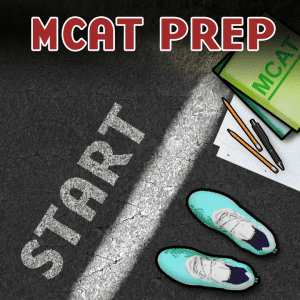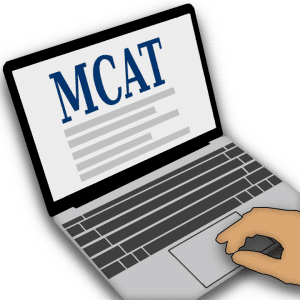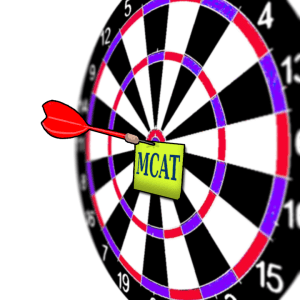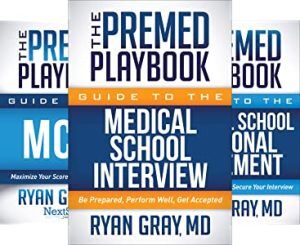 You’ve dreamed of nothing else, and now it’s finally time.
You’ve dreamed of nothing else, and now it’s finally time.
How do you start studying for the MCAT?
All your life, you’ve dreamed of nothing more than becoming a doctor.
Or, perhaps you only recognized your calling later on and are now making a career change.
You’ve slogged through the sciences, endured hours in lab, maybe even started shadowing, volunteering or researching. And now it’s finally time to pick an MCAT date.
The average premed student looks at the Medical School Application Timeline to figure out when to apply, checks the MCAT Testing Calendar, picks a test date and…
Then what?
If you’re wondering…
What’s the best way to prepare for the MCAT?
Where do I start?
WHEN should I start studying for the MCAT?
These are just some of the questions I receive from students on a daily basis, and they are exactly what I will be addressing here.
How To Start Studying For The MCAT
Before jumping into action, we need to take a step back and understand some of the basics.
What Is The MCAT?
MCAT stands for “Medical College Admission Test”, a standardized, computer-based multiple choice exam that was created for the medical school admissions process. To non-premeds, I explain this as the SAT for medical school.

The exam tests you on 3 years worth of undergraduate sciences, including:
- Physics
- General Chemistry
- Organic Chemistry
- Biochemistry
- Biology
- Psychology
- Sociology
Does this mean you need to have completed all of these undergraduate level classes before taking the MCAT?
Not quite! But you WILL need more time to account for self-studying.
There is also a Critical Analysis and Reasoning Skills, or CARS, section.
Read The New MCAT Demystified for a detailed breakdown of each section, including specific topics, number of questions and passages, duration, breaks and more.

Oh, and you’re NOT allowed to use a calculator either.
Fortunately, I’ve got you covered here in my MCAT Math Without A Calculator Video Series.
In fact, I recommend starting with math before anything else.
So you know what the MCAT is all about.
And you know which subjects you’re going to be tested on.
Do you grab your science textbooks and dig in?
Not exactly!
Jumping in without a plan is guaranteed to lead to confusion or overwhelm.
This is why the most critical step in getting STARTED with MCAT prep is taking a step back and planning out EXACTLY what you’re going to do.
And when!
Of course to do that, you need to know:
- Where you stand right now
- EXACTLY where you’re going
Your Content Baseline
Are you starting from scratch?
Are you starting over, having already tested or postponed your exam?
Have you tried studying, taken a step back, and are now starting with a clean slate?
Are you using this guide to re-examine your goals partway through your MCAT prep?
If starting fresh or starting over, set your initial content progress to 0% for each subject.
If you’re already part of the way through content, use this video to calculate EXACTLY where you are right now.
This will help you figure out how long you need for Phase 1 – more on this later.
Your MCAT Baseline
How can you know how much to study, or WHAT to focus on,
If you don’t know your exact starting point?
If you haven’t yet taken your baseline full length,
Or if the last time you tested was over 6 months ago,
Aim to take another FL (MCAT full length practice test) very soon.
Worried you’ll bomb your baseline?
Don’t feel ready to test?
Read this: The Best Time to Take Your 1st MCAT Practice Test
Your MCAT Targets

Now that you know your starting point,
How much do you need to improve?
You can’t simply aim to ‘study study study’ and hope for the best.
And you DEFINITELY don’t want to ‘aim as high as I can’,
Because that can hurt, rather than help, your progress as I explain here:
Why Aiming for a Lower MCAT Score Will Increase Your Med School Chances
Take the time to review and set careful targets, including an ideal test date and target score.
Use this to help you:
Setting Your MCAT Goals and Target Score
Your MCAT Study Schedule
So, how much time do I need to study for the MCAT?
Alas, there is NO generic answer.
Your custom timeline depends on so many factors
-
- figuring out how much time you can devote to studying on a weekly basis,
- how much improvement you need in your scores
- Your background coming into MCAT prep
- How quickly you learn and retain the information
- How well you do on practice full lengths
- And so much more…
First, let’s focus on what we CAN control right now,
By figuring out WHEN you can study.
How many hours per day?
How many total study hours per week?
WHICH specific hours each day?
Use this to help you craft a custom MCAT study schedule that takes your life, family, schoolwork, and job into consideration.
Creating Your Custom MCAT Study Schedule
Did you create your schedule?
Do you have an estimate of how many hours you’ll study each week?
How does that translate to your long-term MCAT study plan?
First, review this: How Much Time Do You REALLY Need? (it’s more than you think)
Now, let’s customize this to YOUR situation.
Where to Study for the MCAT
More than just having dedicated MCAT study time, I urge you to find and commit to an MCAT study location.
Some students study well at home.
Others are too easily distracted by the goings-on of family and/or by having a bed or TV nearby.
If you can’t study at home, where can you study?
- School or library
- Friend’s house
- Local cafe
- Book store
- Outdoors (park, beach… weather permitting)
- In your car? (Yes, I’ve had students do this to escape their toddlers.)
- The lounge of a local hotel?
Check to confirm the hours and rules of your chosen study location.
Then, treat it like showing up to a job.
If you plan to start studying at 8 am, BE at the library by 7:50 so that you have time to set up.
By 8 am, your books should be open, and you should be ready to go.
MCAT Resources – Books, Videos, Practice Material and More
The worst thing you can do for MCAT prep is dig up your old college textbooks for studying.
They’re too long,
Too dense,
Overkill for the MCAT,
And frankly, way too overwhelming.
But with all of the available MCAT resources, even those can become overwhelming.
I urge you to think of the available resources like walking into a supermarket,
ESPECIALLY if you already have a bunch.
Just because they have it,
just because you CAN use it all,
Doesn’t mean you want to.
Choose what will serve you today,
And ignore/hide the rest to avoid getting overwhelmed.
3 Phases of MCAT Prep
Review how to break down your MCAT prep into 3 distinct phases (<– explained here)
A quick recap:
Phase 1 – Content Foundation
- Focus on content with minimal (but not zero) full lengths
Phase 2 – Practice Phase
- About 2 FL’s per month + review, Practice passages + review in between
Phase 3 – Exam Review
- Weekly AAMC full lengths in the last month leading up to your MCAT
Since this is a guide on getting started, we’ll just focus on Phase 1.
Yes, you need to take full lengths to prepare for the MCAT.
And yes, you need to work through many many practice passages to improve.
But NOT yet!
Without a solid content foundation, those passages and full lengths will do more harm than good.
Additionally, while AAMC resources are the most accurate,
actually BECAUSE they are the most accurate,
I recommend saving them for later as I explain here: When and How To Use AAMC Resources
So what SHOULD you prepare to start studying?
First, choose your learning style.
Do you prefer books, videos, or a combination?
Perhaps due to ADHD (see below) I personally learn best from videos, which is why my program (the MCAT Study Hall) is video-based.
Choose ONE source of each:
- One set of videos (of course, I recommend my Study Hall and YouTube videos)
- One set of MCAT prep books (I recommend Examkrackers or Kaplan)
- One source for CARS practice passages. Books are fine for Phase 1 (NS or EK), but go digital for Phase 2.
Prefer a mix of resources?
Consider learning from videos to understand and then fortifying with your MCAT books, using each chapter’s practice questions to gauge your understanding.
Review: 5 Steps to Mastering MCAT Sciences
Aim to study a bit of each subject every week, rather than attacking one subject at a time. Explained here: Why Not To Study One MCAT Subject At A Time
What if you already have another company's MCAT Books?
I compiled an MCAT Resource List for students looking to acquire new resources. And while the better ones help, truth is… it doesn’t REALLY matter.
At the end of the day, Phase 1 is simply about getting a foundation in the sciences and CARS.
If you have an older set, or a set of resources I didn’t specifically recommend, they’re still ok.
Ask yourself this one question: “Does this book feel good enough for me to learn from?”
If the answer is yes, go for it!
What if the book isn’t as good or as in-depth?
That’s ok too because content does NOT end in Phase 1.
If you missed a few things in Phase 1, Phase 2 will emphasize those weaknesses and show you what to review. This means you won’t go into your MCAT unprepared, regardless.
What About Full Lengths?
Full lengths are a great way to gauge your progress and identify weaknesses.
In fact, I have a very specific format in which I ask my students to review their full lengths to ensure they gain maximum data and value from the experience.
But NOT in Phase 1.
Or rather, don’t go crazy in Phase 1.
For now, aim for 1 full length for every 25-33% progress to ensure that what and how you’re studying IS effective.
Phase 2 is when you will REALLY dig into your review tables because THIS is the phase to work on your testing skills, timing, strategy and more.
3 Steps to Raising Your MCAT Scores With Full Length Practice Tests
When to Register for the MCAT
Most of the major MCAT prep companies tell you to pick a test date and then work hard to reach that goal date.
I completely disagree with this advice. Here's what I recommend instead:
Too many students pick an unrealistic goal based on external factors, rather than on the DATA which proves they can be ready in time.
This results in unnecessary pressure until you finally realize, “Hey, I need to move my exam.”
And when you do, you risk losing all or part of your AAMC fees.
Instead, I recommend creating your study plan, evaluating your progress,
And then, when you KNOW FOR SURE you’ll be ready by a given date,
Based on YOUR PROVEN results,
Only then do I recommend signing up for a test date.
What if the seats disappear?
They WILL, and they will also come BACK!
I see this time and time again as I explain in this MCAT Zones video.
What About My Application?
Depending on when you test, you may want to consider starting on your med school application while you study. The application is a long and tedious process, and therefore, setting aside a few hours a week to work on your personal statement or to pre-write essays can save you time and stress later on.
Yes, even if you’re just starting out.
I recommend the following books, kept on your nightstand, as your pre-bedtime reading.
It’ll help you wind down for the night AND prepare for applications. #doublewin
The Premed Playbooks by Dr Ryan Gray
- Guide to the Medical School Personal Statement
- Guide to the Medical School Application Process: Everything You Need to Successfully Apply
- Guide to the Medical School Interview: Be Prepared, Perform Well, Get Accepted
These are Amazon affiliate links. If you purchase a Playbook through the above link, I receive a small commission at no extra cost to you. (So, thanks in advance!)
That Was The Easy Part!
Now that you know what to expect and what you need to put in place,
Now comes the difficult work.
Putting your plan into action, day after day after day,
Until you hit your goals!
What if YOU get in your own way?
Sometimes we’re our own worst enemy.
“I SHOULD be studying, so why am I browsing social media?”
“Why can’t I focus?”
And other issues.
Having dealt with ADHD all my life, I’ve mastered a few tips and tricks that help me stay focused.
If your ADHD is severe, please speak with your doctor/therapist about potential treatments. The following tips can be used in addition to, or in place of medication, depending on severity.
I call the following my ‘ADHD Trifecta’, and the secret behind my productivity.
- No ‘endless’ blocks. Gamify your time with mini rewards using The Pomodoro Technique (customized for the MCAT).
- Instead of forcibly silencing the distractions, acknowledge them for later with the Distraction List.
- Keep track of your time. Stay accountable with something like the Free Toggl app [Video].
Is the distraction internal?
If doubt is what keeps you from putting in 110% effort because you keep questioning yourself,
Understand that imposter syndrome is both real and totally ok.
But if you’re still unsure, watch this:
Ready To Jump In?
To recap:
- Understand the test – what it covers, how long it takes, strategies, etc.
- Identify your content progress and MCAT baseline.
- Set a realistic target that fits YOUR unique situation.
- Create your MCAT study schedule, logistics and all.
- Choose your MCAT study resources.
- Start building your content foundation – Phase 1 of MCAT prep. (No need for FL’s yet.)
- Set aside time to start on your med school application.
- Make sure YOU don’t get in your own way
What does all this look like for an overall MCAT study plan?
See my sample 3 month and 6 month MCAT study plans (each with a downloadable PDF to follow along with).
3 Month MCAT Study Plan
This plan is for you if…
- You can commit to full-time MCAT studying with no other major distractions (work, school, family)
- You're strong in the sciences having recently and successfully completed the prerequisite science classes, while actually understanding the material
- You're looking for a fresh start having recently postponed, or having taken the MCAT, but looking to improve by less than 10 points
If you don’t fit this criteria, please consider giving yourself more time to prepare. The worst thing you can do is rush to take the MCAT, get a lower than desired score, and be forced to take it again.
This sounds like me! Take me to the 3 Month Plan >>
6 Month MCAT Study Plan
This plan is for you if…
- You can commit to near full-time MCAT study (at least 25-30 hours per week) with limited external distractions (family, work, school).
- You have a reasonable science foundation, and don’t need to relearn any complete subject slowly from scratch.
- You're looking to improve your MCAT scores by 10-15 points
If you don’t fit the above criteria that’s ok. Simply use the 6 month plan as a starting place and stretch your study plan out to allow for more weeks with fewer weekly study hours, missing science courses, or a higher target score jump.
Take me to the 6 Month Plan >>
I Want To Hear From You!
What is your biggest challenge or concern regarding getting started with your MCAT prep? Let me know in the comments below.


